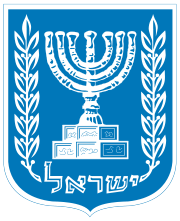President of Israel
|
||||||||||||||||||
|
||||||||||||||||||

Office of the President of Israel (2007)
|
||||||||||||||||||
The President of the State of Israel (Hebrew: נשיא המדינה, Nasi HaMedina, lit. President of the State; Arabic: رئيس الدولة) is the head of state of Israel. The position is largely an apolitical ceremonial figurehead role,[1] with the real executive power lying in the hands of the Prime Minister. The current president is Shimon Peres who took office on 15 July 2007. Presidents are elected by the Knesset for a seven year term, and are limited to a single term.
Contents |
Election
The president is elected by an absolute majority in the Knesset. If, by the third round of voting, no candidate receives an absolute majority, a simple majority is sufficient. A full term is seven years and a president cannot be re-elected to a second term. Until recently, the president was elected for a five-year term, and was allowed to serve up to two terms in office. In 2000, the president's term was increased to seven years.
Any Israeli citizen who is a resident of the State is eligible to run for president. The office falls vacant upon completion of a term, resignation, or the decision of three-quarters of the Knesset to remove the president on grounds of misconduct or incapacity. Presidential tenure is not keyed to that of the Knesset in order to assure continuity in government and the nonpartisan character of the office. There is no vice president in the Israeli governmental system. If the president is temporarily incapacitated or leaves office, the speaker of the Knesset becomes acting president.
The first presidential election took place on 16 February 1949, and the winner was Chaim Weizmann. The second took place in 1951, as at the time presidential terms were linked to the length of the Knesset term (the first Knesset lasted only two years). Another election took place the following year after Weizmann's death.
Since then, elections have been held in 1957, 1962, 1963 (an early election following Yitzhak Ben-Zvi's death), 1968, 1973, 1978, 1983, 1988, 1993, 1998, 2000 and 2007. Six elections (1951, 1957, 1962, 1968, 1978 and 1988) have taken place with no opposition candidate, although a vote was still held.
Presidential powers
The powers of the President of Israel are generally equivalent to those held by heads of state in other parliamentary democracies and are largely dictated by Basic Law: The Presidency,[2] which was passed in 1964.[3] According to paragraph 11a of the basic law, the president signs every law (except those that pertain to the president's powers) and international or bilateral treaties approved by the Knesset.[2] In addition, he or she appoints the Governor of the Bank of Israel, judges to secular and rabbinical courts, and kadis to Islamic courts, as well as members of the Council on Higher Education, the National Academy of Science, the Broadcasting Authority, the Authority to Rehabilitate Prisoners, the Chief Rabbinical Council, the Wolf Foundation. He or she also confirms and endorses the credentials of ambassadors and receives the credentials of the foreign diplomats.
To ensure the apolitical nature of the role, the president may "neither intervene politically nor express personal views on issues that divide the public".[2]
The Basic Law: The Government also includes sections on the powers of the president with reference to the government.[2] The president is charged with choosing a member of the Knesset to form a government after consultation with the parties represented in it. This occurs either after elections, after a government or Prime Minister has resigned or after a government has lost a motion of no confidence.[2] Usually the head of the largest party is asked to form the government, but on at least two occasions, other members have been asked; after David Ben-Gurion failed to get Knesset approval for a minority government in 1950, Chaim Weizmann asked Progressive Party leader Pinchas Rosen to do so (ultimately Ben-Gurion managed to form one instead).[4] Following the 2009 elections, Shimon Peres asked Likud leader Benjamin Netanyahu to form a government, despite Likud coming second to Kadima in the elections.
In addition, paragraph 29a of The Government basic law also states that the president must give consent to dissolve the Knesset at the request of the Prime Minister in cases where the government has lost its majority, and that this prevents its effective functioning.[2]
Presidential powers are usually exercised based on the recommendation of appropriate government ministers.
Presidential background
Most Israeli presidents were involved in national politics or Zionist activities before taking office. Some were also distinguished in other fields: Chaim Weizmann was a leading research chemist who founded the Weizmann Institute of Science in Rehovot; Zalman Shazar was an author, poet, and journalist; and Chaim Herzog was a military leader, attorney, and diplomat.
The first Israeli presidents were born in Russia, which was true of much of the leadership in the early days of the state. The first native-born president, as well as the first with a Sephardic background, was Yitzhak Navon. The first president with a Western European background was Chaim Herzog, who originally came from Belfast. The first president from a Middle Eastern country outside of Israel was Moshe Katsav, who was born in Iran.
Political affiliation
All Israeli presidents from Yitzhak Ben-Zvi to Ezer Weizman were members of, or associated with, the Labor Party and its predecessors, and have been considered politically moderate. Moshe Katsav was the first Likud president. These tendencies were especially significant in the April 1978 election of Labor's Yitzhak Navon, following the inability of the governing Likud coalition to elect its candidate to the presidency. Israeli observers believed that, in counterbalance to Prime Minister Menahem Begin's polarizing leadership, Navon, the country's first president of Sephardi origin, provided Israel with unifying symbolic leadership at a time of great political controversy and upheaval. In 1983 Navon decided to re-enter Labour politics after five years of nonpartisan service as president, and Chaim Herzog (previously head of military intelligence and Ambassador of Israel to the United Nations) succeeded him as Israel's sixth president. Likud's Moshe Katsav's victory over Labor's Shimon Peres in 2000 (by secret ballot) was an upset.
Albert Einstein, a Jew but not an Israeli citizen, was offered the presidency in 1952 but turned it down, stating "I am deeply moved by the offer from our State of Israel, and at once saddened and ashamed that I cannot accept it."[5] Ehud Olmert was reported to be considering offering the presidency to another non-Israeli, Elie Wiesel, but he was said to be "very not interested".[6]
List of Presidents of the State of Israel
Living former presidents
As of December 2009, there are two living former presidents. The most recent president to die was Ephraim Katzir (1973–1978), on 30 May 2009. The most recently serving president to die was Ezer Weizman (1993–2000), who died on 24 April 2005.
| Name | Term of office | Date of birth |
|---|---|---|
| Yitzhak Navon | 1978–1983 | 9 April 1921 |
| Moshe Katsav | 2000–2007 | 5 December 1945 |
References
- ↑ The Presidency in Israel President of Israel
- ↑ 2.0 2.1 2.2 2.3 2.4 2.5 The Function and Purpose of the Presidency President of Israel
- ↑ The Existing Basic Laws: Full Texts Knesset website
- ↑ 1950 timeline Jewish Agency for Israel
- ↑ Einstein in Princeton Scientist, Humanitarian, Cultural Icon Historical Society of Princetown
- ↑ Olmert backs Peres as next president Jerusalem Post, 18 October 2006
External links
- Official website
- Basic Law: The President of the State Knesset website
|
||||||||||
|
||||||||
.svg.png)

